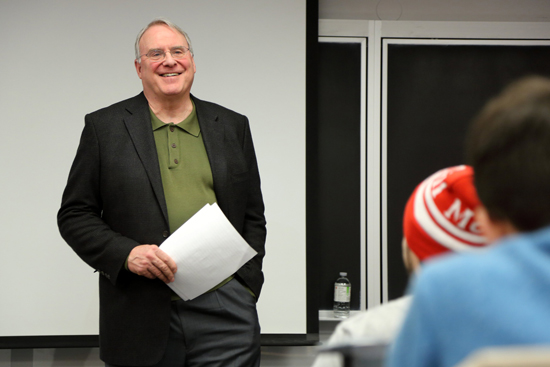
By Neale McDevitt
When Ken Dryden gets students to talk about the future in his Canadian Studies course he has one rule – people can’t use the word “they.”
“The hardest part is the ‘They.’ The future is always made by the Theys,’” said the six-time Stanley Cup winning goaltender for the Montreal Canadiens and former Liberal Member of Parliament for York Centre. “But I tell my students ‘this is about your life now. This is about you.’”
The concept for the Making the Future course is simple, but a bit radical. Instead of a traditional Canadian Studies overview that looks broadly at Canadian politics, history, literature, etc., Dryden takes an approach that is more focused – and more personal. “We choose a different subject each week – the workplace, religion, healthcare, public engagement and politics, etc. And we have experts come in and, for the first half of the class, they to talk about the past and present of their field,” Dryden told the McGill Reporter.
“But we challenge the students in the second half, by discussing the future of the field. If this is the way things are now, and you’re going to live for another 60+ years, how do you get from here to where you want to be?
“For example, I’ll ask them how healthcare fits into their understanding about the way they live? And some will say ‘I hope I will have what I need when I need it. Then I could just get on with the rest of my life and I don’t have to use 40 per cent of my focus worrying about this,’” said Dryden. “That’s a good starting point, but then we have to ask how do we get from here to there? What is standing in the way and what are they, as individuals, going to do about it? It’s always trying to get it back to the most basic.”
But it isn’t only the students who are challenged. Dryden also puts his presenters to the test by asking them to talk as a 20-year-old armed with their current understanding of their specialty. “I ask them ‘So, knowing what you know about, for example, healthcare and this country, but having another 60+ years to live and another 40+ years to work in this field, how would you approach it? What would you do differently? What steps would you take? How would you transform it?’”
The result is a lot of reflection and conversation, which is exactly what Dryden is hoping to inspire – and expand upon.
Having taught the course for two years at McGill, he has branched out this semester with the course being taught simultaneously at the University of Calgary thanks to modern live broadcast technology that links the two classrooms. Dryden and his guests will alternate between universities throughout the semester, so that there is always be a “live” person in each classroom.
“We haven’t done it this way before but we know this [live linking of classrooms] will be coming in the future so let’s give it a try,” said Dryden. “The technology isn’t perfect. There will be glitches and it will be awkward at times as we try to create the illusion that we are in the same space. But I’m of the belief that it will be a useful experience for the students because it brings together a lot of different backgrounds, a lot of different perspectives.”
Dryden has long been an advocate of the collective experience, harkening back to his days with the Habs.
“When I was playing for the Canadiens and we were winning all the time, the natural question for journalists was ‘what makes you so good? Why do you keep winning’ said Dryden. “It’s not an easy question to answer beyond the obvious: we had better players. People would just accept that was the Canadiens’ tradition.
“But what is that?” continued Dryden. “Well, it is that set of understandings that when you work here as a player, a coach, a scout, a manager, an owner or anybody in the office that this is how things are done here. This is the expectation and this is the standard.
“It’s a powerful thing when you have the right understanding because it generates its own success. Players don’t just arrive having won everything where they were, and neither do coaches or managers,” says Dryden. “You really need to be in the right environment where everybody supports each other’s weaknesses and enhances each other’s strengths in order for it to happen.”
As has been his wont throughout his various careers, Dryden has great ambitions for Making the Future. “If we can make it work in two places, why not five? Why not 10,” he asks. “Canada will celebrate its 150th birthday in 2017. On occasions like that there is an instinct to stop, look around and see where we’ve been, where we are and where we are heading. It would be great to have a larger conversation – across the whole country – to see if we’re moving in the right direction.”

Inspiring. Great idea for a course. I am currently reading The Game, to get to know the author a bit better. I was a serious young hockey fan during Ken Dryden’s career. And at a very deep level, I identify with his descriptions of backyard ball hockey – which seem to me to be a very Canadian experience from that time, if not also from today. I think we should begin anticipating the country’s 150th birthday (in 2017) in some fashion today. I feel a great malaise in Quebec society these days and worry about whether it isn’t also the… Read more »